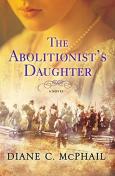BKMT READING GUIDES
The Abolitionist's Daughter
by Diane C. McPhail
Hardcover : 336 pages
2 clubs reading this now
0 members have read this book
On a Mississippi morning in 1859, Emily Matthews ...
Introduction
In her sweeping debut, Diane C. McPhail offers a powerful, profoundly emotional novel that explores a little-known aspect of Civil War history—Southern Abolitionists—and the timeless struggle to do right even amidst bitter conflict.
On a Mississippi morning in 1859, Emily Matthews begs her father to save a slave, Nathan, about to be auctioned away from his family. Judge Matthews is an abolitionist who runs an illegal school for his slaves, hoping to eventually set them free. One, a woman named Ginny, has become Emily’s companion and often her conscience—and understands all too well the hazards an educated slave must face. Yet even Ginny could not predict the tangled, tragic string of events set in motion as Nathan’s family arrives at the Matthews farm.
A young doctor, Charles Slate, tends to injured Nathan and begins to court Emily, finally persuading her to become his wife. But their union is disrupted by a fatal clash and a lie that will tear two families apart. As Civil War erupts, Emily, Ginny, and Emily’s stoic mother-in-law, Adeline, each face devastating losses. Emily—sheltered all her life—is especially unprepared for the hardships to come. Struggling to survive in this raw, shifting new world, Emily will discover untapped inner strength, an unlikely love, and the courage to confront deep, painful truths.
In the tradition of Cold Mountain, The Abolitionist’s Daughter eschews stereotypes of the Civil War South, instead weaving an intricate and unforgettable story of survival, loyalty, hope, and redemption.
Discussion Questions
1. How familiar are you with instances of opposition to slavery in the South? Were you surprised to learn about Southern Abolitionism? Do you know any stories of other areas of resistance to slavery in the South? How do you understand the underlying foundations of such opposition?2. Were you aware that by the 1820s, manumission—freeing slaves—had become nearly impossible and ultimately illegal? What are your thoughts on the moral dilemma of a man opposed to slavery being himself a slave owner?
3. We often think of the “frontier” as the expansion out into the West of the United States. Were you surprised at the idea that Mississippi was, indeed, “frontier” in the early to mid-1800s? Since this novel is based on actual history, how does life in Greensboro fit with your concepts of the frontier?
4. As legends often do, the story of the Greensboro “feud” has taken on a dual tone of “good guys/bad guys,” based solely on the motivation of land greed. Yet these families had enough in common that two siblings from each family married siblings from the other. What are your thoughts on the relationship of these two families? What were your initial ideas on reading of the murder and mob lynching?
5. We all have certain unconscious assumptions based on our cultural background. Where and how do you see such assumptions playing out among the characters in the novel? Did you find yourself affected by your own assumptions as you read?
6. Today we are all familiar with the concept of PTSD, especially in military conflict. The novel examines numerous traumas of a non-military nature and the long-range effects on various characters. How do you see this playing out in the book? Were you surprised to learn that those effects can be lifelong? How do you see the courage of various characters to overcome their trauma?
7. The Civil War marked the beginning of a major shift in the role of women in the United States, leading to the suffragist movement around the turn of the century. What factors do you see contributing to that shift? How do you see the shift in Emily as a woman as a parallel to this historic shift for women in general? How do you perceive Emily: for example, strong, weak, changeable, likable, unlikable, realistic, idealized, simple, or complex? What qualities in her did you relate to personally?
8. Which of the masculine characters did you identify with? What qualities appealed to you? Frustrated you? Which did you admire or find courageous?
9. Were you surprised by ambiguities and conflicts in various characters? Did you identify with any of them? Where did you find qualities to admire?
10. In general, which characters or scenes might have made you think about your own pre-judgments? Were you surprised? Has that changed your thinking on any current issues or on the tendency we all have toward premature judgment of others without knowing their full story? How do you see these issues continuing to play out in current events?
Book Club Recommendations
Recommended to book clubs by 0 of 0 members.
Book Club HQ to over 90,000+ book clubs and ready to welcome yours.
Get free weekly updates on top club picks, book giveaways, author events and more








